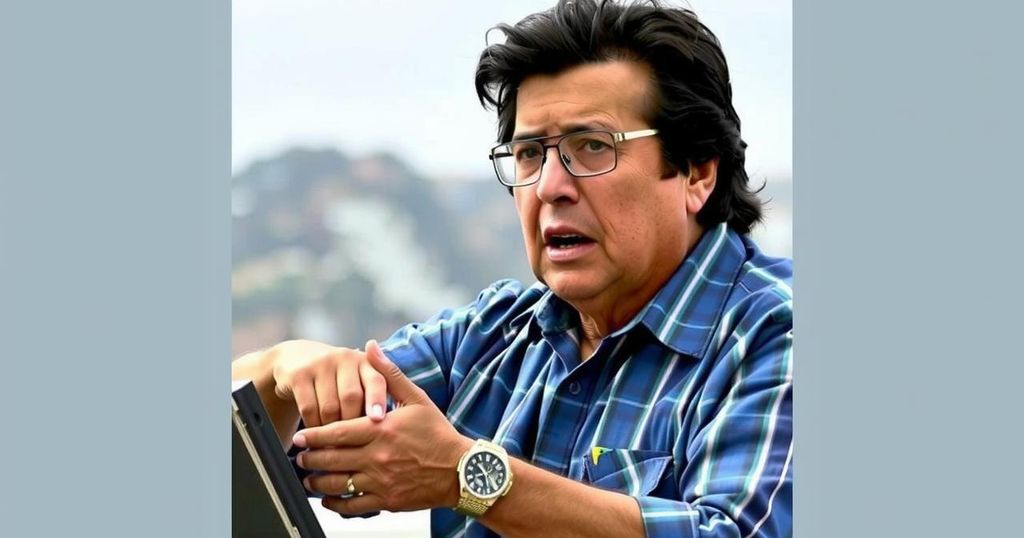Evo Morales Claims Assassination Attempt Following Shooting Incident

Evo Morales, former president of Bolivia, reported an assassination attempt when his car was shot at. The incident involved unidentified assailants and occurred near a military barracks. Morales’s party, Movement for Socialism, holds the current government responsible, while President Arce has condemned the violence and promised an investigation. Tensions rise as both leaders plan to compete for the Mas party candidacy in the 2025 elections amid Morales’s ongoing legal challenges.
Evo Morales, the former president of Bolivia, claimed on Sunday that an assassination attempt had been made against him when a car he occupied was shot at. In a video shared on his social media platforms, Morales displayed the vehicle’s windscreen, which bore at least two bullet holes. The Movement for Socialism (Mas) party, to which Morales belongs, asserted that unidentified assailants, described as men in black, opened fire on his car as it passed by a military facility. The party subsequently attributed responsibility for the incident to the government of President Luis Arce. In response to the allegations, President Arce condemned political violence and promised a thorough investigation into the incident. Despite their shared affiliation with the Mas party, relations between Morales and Arce have soured significantly over recent competitions for the party’s candidacy in the 2025 presidential election. Mr. Morales further alleged that the attack represented a coordinated effort involving both military and police forces. He expressed that a bullet had narrowly missed him and stated that the driver suffered injuries during the attack, which occurred close to the Ninth Division of the Bolivian Army near Villa Tunari. According to a faction within the pro-Morales camp, those responsible for the attack infiltrated the military barracks and were subsequently evacuated via military helicopter. They proclaimed that this incident is not an isolated occurrence but rather indicative of a broader fascist agenda under the current government. Having served as president from 2006 until his resignation in 2019 following accusations of electoral fraud, Morales currently faces several legal challenges, including allegations of statutory rape and human trafficking, which he vehemently denies. In recent weeks, supporters of Morales have engaged in nationwide protests, blocking essential roadways and clashing with law enforcement. He argues that the charges against him are politically motivated and the result of a right-wing conspiracy led by the interim president who succeeded him after his departure from office. Both Morales and Arce maintain significant loyal followings, often willing to take to the streets to demonstrate their support and, at times, engage in physical confrontations with opposing factions.
Evo Morales previously held the position of President of Bolivia from 2006 until 2019, during which he was instrumental in implementing numerous social reforms and nationalizing various sectors of the economy. However, his presidency was marred by controversies, particularly surrounding the 2019 election, which culminated in claims of fraud and his eventual resignation. Since then, Bolivia has experienced political unrest, with divisions within the governing Mas party becoming more pronounced. Morales’s legal issues—ranging from allegations of sexual misconduct to other serious charges—have compounded tensions, with supporters perceiving them as part of a political vendetta. The recent attack on Morales’ vehicle has heightened concerns regarding the safety of political figures in Bolivia and the threats posed by the ongoing political conflict.
In summary, Evo Morales has alleged that an assassination attempt was made against him when gunfire targeted the vehicle he was in. The incident has sparked significant political ramifications, with Morales’s party blaming the current government while President Arce has mandated an investigation. As both leaders vie for leadership within their party in the upcoming presidential election, the internal disputes and accusations of politically motivated violence signal an increasingly volatile political environment in Bolivia. Morales continues to contend that the legal challenges he faces are part of a right-wing conspiracy against him following his ouster from the presidency in 2019. As the situation unfolds, the impact of these events on Bolivia’s political landscape remains to be seen.
Original Source: www.bbc.com







